David Bowie
4 posters
Page 1 of 2
Page 1 of 2 • 1, 2 
 David Bowie
David Bowie
The Man Who Sold the World: David Bowie and the 1970s by Peter Doggett – review
A song-by-song analysis shows how David Bowie embodied a decade
Christopher Bray
guardian.co.uk, Thursday 20 October 2011 15.25 BST
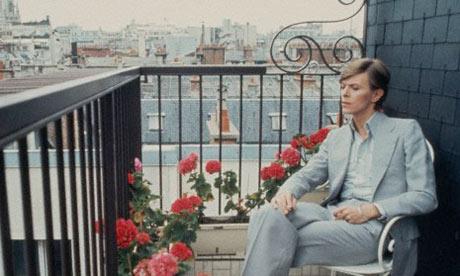
David Bowie in Paris, 1977. Photograph: Christian Simonpietri/Sygma/Corbis
What's this? A book about David Bowie with no pictures inside? Your average Bowie book is composed of little but pictures, the better for purchasers to feast on all that satin and tat. Not for nothing did Bowie call one of his records Pin Ups. He knew that his fans liked looking at him at least as much as they liked listening to him. Brian Duffy, who shot the famously homoerotic image for the cover of Aladdin Sane, wasn't wrong when he called Bowie "a boy who liked dressing up". There was always more to Bowie than perms and pan-stick, but the credits on many of his greatest albums didn't style him "the Actor" for nothing.

The Man Who Sold The World: David Bowie And The 1970s
by Peter Doggett
Stage-struck and starry-eyed, Bowie loved the paraphernalia of thespianism almost as much as his worshippers did. Indeed, the one concession to the visual in Peter Doggett's thrilling new study of Bowie is its dust-jacket portrait of our pouting hero emerging from behind a Kabuki mask – an image that serves as a lovely pointer to the book's contents. A work of impeccable scholarly exegesis, The Man Who Sold the World is about as far removed from conventional biography as its subject is from run-of-the-mill rock'n'roll. Still, it is hard to imagine another book telling you more of what really matters about David Bowie than this one.
Its "unashamed model" is Revolution in the Head, Ian MacDonald's song-by-song analysis of the Beatles' oeuvre and its place in 60s culture. In fact, MacDonald was subsequently commissioned to write a companion volume on Bowie and the 70s. (A few tracks on Heathen aside, Bowie hasn't done anything of note since 1980's Scary Monsters.) Alas, MacDonald had apparently done little or no work on the book when, in 2003, he took his own life. Into the breach steps Doggett, whose own books on the Beatles and on rock's (frequently spurious) claims to radical politicking evince a man wholly at ease with MacDonald's brand of historicist aesthetics.
Not, says Doggett, that he has a hope in hell of besting his predecessor when it comes to formal analysis. "Ian MacDonald was a trained musicologist," he tells us in his introduction. "I have chosen to take more of a layman's path through Bowie's music." Some layman. Did you know that "Space Oddity" opens with a floating Fmaj7, and if you did – or could have worked it out with a little noodling – did you know that "the C chord that established the key was played higher up the guitar neck than its companions, despite occupying a lower place on the scale"? "He's only an eye," Cezanne said of Monet, "but my god, what an eye!" Pete Doggett, I think we can safely say, has a my-god of an ear.
But is the ear attached to a my-god of an intellect? Can Doggett move beyond the descriptive and categorical into the discerning and critical? Later on in his discussion of "Space Oddity" he mentions an "almost ethereal sequence of 'ninth' chords that suggested the spaceman hanging free" and a "Mick Wayne guitar solo that seemed to be testing out the walls of Major Tom's prison". I like that "seemed" even less than I like that "suggested", and can't help wondering whether those same ninth chords might not equally "signify" entrapment in a song whose lyric required them to. We are back, I'm afraid, with the old chestnut about music and meaning – about whether, say, the flute motif at the start of Beethoven's Pastoral evokes birdsong or merely reminds us that flautists, like birds, can make incomprehensible sounds that nevertheless please the human ear.
Thankfully, Doggett's more impressionistic judgments are spot on. Aladdin Sane is "a more 'real' album than Ziggy Stardust" – and "a more rewarding one" too. The beautifully multi-dubbed chorus vocal on Diamond Dogs's "Sweet Thing" does sound "pinched yet desperate". The "climactic 'genocide' line" in "Future Legend" is "silly". Bowie's "daredevil mutation into a Philadelphia soul man" on Young Americans did indeed "mask… self-disclosure". Less of a downer than it is often taken for, Low really does "convey… a state of emotional dissonance, in which depression [can] be uplifting and boredom become transcendent".
But it is in contextualising Bowie, in showing how he was nourished by multifarious aesthetic traditions, that Doggett comes into his own. Bowie was always candid about his work being a mash-up of whatever he'd been listening to or watching or reading, though he was often too drug-addled to actually detail chapter and verse. Not so Doggett, who as well as having a fully annotated mental jukebox he can access at will, appears to have read everything from Arendt to Zarathustra. He even owns up to having pushed his eyes through Colin Wilson, demonstrating pretty convincingly that Bowie swiped the imagery for Hunky Dory's "Quicksand" from Wilson's recently published The Occult. Hegel, weirdly, doesn't get a mention, though every page is infused with his spirit – so much so that the book could be called called "Ziggy Zeitgeist and the Riders from Marx". Hence Bowie, for Doggett, was the pre-eminent artist of the 70s because he embodied the decade's entropic dread as much as – perhaps more than – the happy-go-lucky antics of the Beatles did for its predecessor.
Does this mean that our own straitened times augur well for a Bowie comeback? We can but hope. Meantime, we have this challenging, cherishable goad of a guide to the great man's most vital work. Ian MacDonald might have done it differently, but he couldn't have done it better, and The Man Who Sold the World takes its place next to Revolution in the Head on the short shelf of necessary reading about pop. Praise doesn't come any higher.
© 2011 Guardian News and Media Limited or its affiliated companies. All rights reserved.
A song-by-song analysis shows how David Bowie embodied a decade
Christopher Bray
guardian.co.uk, Thursday 20 October 2011 15.25 BST

David Bowie in Paris, 1977. Photograph: Christian Simonpietri/Sygma/Corbis
What's this? A book about David Bowie with no pictures inside? Your average Bowie book is composed of little but pictures, the better for purchasers to feast on all that satin and tat. Not for nothing did Bowie call one of his records Pin Ups. He knew that his fans liked looking at him at least as much as they liked listening to him. Brian Duffy, who shot the famously homoerotic image for the cover of Aladdin Sane, wasn't wrong when he called Bowie "a boy who liked dressing up". There was always more to Bowie than perms and pan-stick, but the credits on many of his greatest albums didn't style him "the Actor" for nothing.

The Man Who Sold The World: David Bowie And The 1970s
by Peter Doggett
Stage-struck and starry-eyed, Bowie loved the paraphernalia of thespianism almost as much as his worshippers did. Indeed, the one concession to the visual in Peter Doggett's thrilling new study of Bowie is its dust-jacket portrait of our pouting hero emerging from behind a Kabuki mask – an image that serves as a lovely pointer to the book's contents. A work of impeccable scholarly exegesis, The Man Who Sold the World is about as far removed from conventional biography as its subject is from run-of-the-mill rock'n'roll. Still, it is hard to imagine another book telling you more of what really matters about David Bowie than this one.
Its "unashamed model" is Revolution in the Head, Ian MacDonald's song-by-song analysis of the Beatles' oeuvre and its place in 60s culture. In fact, MacDonald was subsequently commissioned to write a companion volume on Bowie and the 70s. (A few tracks on Heathen aside, Bowie hasn't done anything of note since 1980's Scary Monsters.) Alas, MacDonald had apparently done little or no work on the book when, in 2003, he took his own life. Into the breach steps Doggett, whose own books on the Beatles and on rock's (frequently spurious) claims to radical politicking evince a man wholly at ease with MacDonald's brand of historicist aesthetics.
Not, says Doggett, that he has a hope in hell of besting his predecessor when it comes to formal analysis. "Ian MacDonald was a trained musicologist," he tells us in his introduction. "I have chosen to take more of a layman's path through Bowie's music." Some layman. Did you know that "Space Oddity" opens with a floating Fmaj7, and if you did – or could have worked it out with a little noodling – did you know that "the C chord that established the key was played higher up the guitar neck than its companions, despite occupying a lower place on the scale"? "He's only an eye," Cezanne said of Monet, "but my god, what an eye!" Pete Doggett, I think we can safely say, has a my-god of an ear.
But is the ear attached to a my-god of an intellect? Can Doggett move beyond the descriptive and categorical into the discerning and critical? Later on in his discussion of "Space Oddity" he mentions an "almost ethereal sequence of 'ninth' chords that suggested the spaceman hanging free" and a "Mick Wayne guitar solo that seemed to be testing out the walls of Major Tom's prison". I like that "seemed" even less than I like that "suggested", and can't help wondering whether those same ninth chords might not equally "signify" entrapment in a song whose lyric required them to. We are back, I'm afraid, with the old chestnut about music and meaning – about whether, say, the flute motif at the start of Beethoven's Pastoral evokes birdsong or merely reminds us that flautists, like birds, can make incomprehensible sounds that nevertheless please the human ear.
Thankfully, Doggett's more impressionistic judgments are spot on. Aladdin Sane is "a more 'real' album than Ziggy Stardust" – and "a more rewarding one" too. The beautifully multi-dubbed chorus vocal on Diamond Dogs's "Sweet Thing" does sound "pinched yet desperate". The "climactic 'genocide' line" in "Future Legend" is "silly". Bowie's "daredevil mutation into a Philadelphia soul man" on Young Americans did indeed "mask… self-disclosure". Less of a downer than it is often taken for, Low really does "convey… a state of emotional dissonance, in which depression [can] be uplifting and boredom become transcendent".
But it is in contextualising Bowie, in showing how he was nourished by multifarious aesthetic traditions, that Doggett comes into his own. Bowie was always candid about his work being a mash-up of whatever he'd been listening to or watching or reading, though he was often too drug-addled to actually detail chapter and verse. Not so Doggett, who as well as having a fully annotated mental jukebox he can access at will, appears to have read everything from Arendt to Zarathustra. He even owns up to having pushed his eyes through Colin Wilson, demonstrating pretty convincingly that Bowie swiped the imagery for Hunky Dory's "Quicksand" from Wilson's recently published The Occult. Hegel, weirdly, doesn't get a mention, though every page is infused with his spirit – so much so that the book could be called called "Ziggy Zeitgeist and the Riders from Marx". Hence Bowie, for Doggett, was the pre-eminent artist of the 70s because he embodied the decade's entropic dread as much as – perhaps more than – the happy-go-lucky antics of the Beatles did for its predecessor.
Does this mean that our own straitened times augur well for a Bowie comeback? We can but hope. Meantime, we have this challenging, cherishable goad of a guide to the great man's most vital work. Ian MacDonald might have done it differently, but he couldn't have done it better, and The Man Who Sold the World takes its place next to Revolution in the Head on the short shelf of necessary reading about pop. Praise doesn't come any higher.
© 2011 Guardian News and Media Limited or its affiliated companies. All rights reserved.

eddie- The Gap Minder
- Posts : 7840
Join date : 2011-04-11
Age : 68
Location : Desert Island
 Re: David Bowie
Re: David Bowie
^
Adam Ant??
Adam Ant??

eddie- The Gap Minder
- Posts : 7840
Join date : 2011-04-11
Age : 68
Location : Desert Island
 Re: David Bowie
Re: David Bowie
^
I see.
I see.

eddie- The Gap Minder
- Posts : 7840
Join date : 2011-04-11
Age : 68
Location : Desert Island
 Re: David Bowie
Re: David Bowie
Central Broadcasting System! Pah! I remember when CBS was the Columbia Broadcasting System. I remember when Bob Dillon's Columbian LP recordings appeared in the Untied Kingdom on the CBS (orange) record label. ('Cos Elektrikal & Mustical Industires owned the Columbia - Magic Notes (TM) - name in this country). And I remember when Sony were renowned throughout the civilised and uncivilised worlds for the manufacture of cheap and - to be brutally honestish - nasty little portable transister wirelesses, retailing off the back of a scruffy lorry for in the region of £5 GB pounds streling.user wrote:Viacom was formed by the Central Broadcasting System (CBS) in the summer of 1970
Things have changed, or so Mr Dillon avers.

felix- cool cat - mrkgnao!
- Posts : 836
Join date : 2011-04-11
Location : see the chicken?
 Re: David Bowie
Re: David Bowie
The Man Who Sold the World by Peter Doggett - review
David Bowie and the decade of misgivings
Lynsey Hanley
guardian.co.uk, Thursday 22 December 2011 09.00 GMT

'To see cracks in the sky is not really quite on': Bowie as Ziggy Stardust. Photograph: Michael Putland/Getty Images
If the 1970s are remembered fondly at all, it's through the prism of stack heels, feathers, glitter and flares, yet on BBC4 at the moment you can have your memories of the glam rock era destroyed in half an hour by watching old episodes of Top of the Pops. It's clear that Cliff Richard and the Wurzels spent more time in the charts than Roxy Music or T Rex, forming an incongruously bland soundtrack to years of political and industrial upheaval.

The Man Who Sold The World: David Bowie and the 1970s
by Peter Doggett
"The decade of David Bowie," writes Peter Doggett of his latest subject, was fired not "by idealism or optimism, but by dread and misgiving". The latter sentiments, along with bitterness and blame, comprise "the dominant folk memory" of the 1970s, the 1960s having ended sourly for those who had believed in the promise of social transformation.
Doggett's previous book, You Never Give Me Your Money, was an account of how the Beatles, having preached spiritual investment and material divestment in the previous decade, spent years after their split in 1970 dragging each other through courts and accountants' offices. In The Man Who Sold the World he retrieves this thread of disillusionment and applies it to Bowie's "long Seventies", which begins with his first hit, 1969's "Space Oddity", and ends with 1980's Scary Monsters, for most fans his last truly satisfying album.
David Bowie remains a cult artist (though a hugely popular one) in a way the Beatles never were. There's an extent to which you already have to be a pop music fan in order to be a Bowie fan, and his appeal in the 1970s did not extend across the generations.
Bowie's music and image-making are strikingly important to our notion of the British propensity for intense, unusual creativity in pop culture. His originality is a source of pride, though Doggett's detailed study reveals this to be more a genius for stealing the right bits from his rivals. He created Ziggy Stardust partly from how he perceived Marc Bolan to be at the height of his fame: spectral, imperious, out of control.
The book's song-by-song format takes after Revolution in the Head, Ian MacDonald's superb 1994 study of the Beatles. Doggett writes that MacDonald was under contract to write a similar analysis of Bowie's work at the time of his death in 2003; he was asked by MacDonald's editor to revive the project, which he does admirably.
His sharpest insights come in the discussion of what he clearly feels are the most important songs. Hunky Dory's "Oh! You Pretty Things", with its creepy exhortation to "make way for the Homo Superior", is only in part a hymn to Nietzsche. It was also a way for Bowie, in his own words, to write his "own problems out": the "crack in the sky" he witnesses in the first verse was first reported by his half-brother, Terry Burns, incarcerated in a south London asylum for nearly 20 years before he killed himself in 1985. "According to Jung," Bowie once observed with rare understatement, "to see cracks in the sky is not really quite on."
Doggett discusses Bowie's cocaine use, which left him "ravaged beyond belief" on his 1974 American tour, and his repeated references in interviews to the coming of a Hitler-like leader. Even in the 1960s he was harping on about this, which suggests that his notorious mid-1970s comments on the desirability of British fascism sprang as much from a genuine conviction that society was fragmenting as from his drug addiction.
The songs on the 1974 album Diamond Dogs, which loosely trace the story arc of George Orwell's Nineteen Eighty-Four, give weight to this idea. The songs "We Are the Dead" and "1984" were sketched out after Bowie took the Trans-Siberian Express across "the fabled communist paradise" of Russia. He told his wife, Angie, that he had "never been so damned scared in my life". Listening to the song's paranoid chorus – "Beware the savage jaw of 1984" – Doggett conjures "the image of a rabid slobbering hound".
He identifies the album's "nexus between science fiction, catastrophe and consumerism" as having been a preoccupation of the 1950s, carried into the 1970s by writers such as JG Ballard and Colin Wilson, whose 1971 history of the occult was read and absorbed, perhaps a bit too comprehensively, by the autodidact rock star. Bowie said in a later interview about the 1970s that "nobody knew who they were" once the 1960s were over: to him, the National Front, union membership, neoliberal thought, or punk rock, whether illusive or transformative, were rudders for the rudderless – all Big Brothers of a kind.
In his book In the Seventies (Serpent's Tail, £14.99), the biographer and memoirist Barry Miles has broadly the same take on the decade as Doggett, but his account's blithe style and the notable absence of political figures or movements beyond the transatlantic underground hint that he was part of that turn inwards, away from collective action towards self-actualisation.
In the Seventies returns to themes and subjects familiar to readers of Miles's 2002 book In the Sixties, notably his recording and archiving work with Allen Ginsberg and William Burroughs, which took him to upstate New York, where he was an enthusiastic participant in Ginsberg's commune for city-frazzled poets, before returning to the countercultural bubbles of downtown Manhattan and Berkeley, California.
The son of domestic servants, he lightly skewers the pretensions of the privileged, yet angry, drop-outs he encounters. Abbie Hoffman and Jerry Rubin, "self-appointed youth leaders" who sabotage a Greenwich Village benefit in 1970 for the imprisoned psychologist Timothy Leary, possess "two enormous egos" which "buffeted around the room like weather balloons".
He eventually moves to the Chelsea Hotel, where he had stayed at the end of the 1960s, and then back to London, where he writes for the NME, wolfing smoked salmon and champagne at press junkets and being flown to New York on Concorde for the sole purpose of reviewing a Tangerine Dream concert. All this is related in a way which suggests that such experiences are, if not normal, then accessible to anyone who is able to shake off the shackles of class and societal expectation, regardless of the times they live in. Miles told the Guardian last year that his mother used to scold him for his aspirations, saying: "You're flying too high, my boy." Unlike Bowie, who described "hitting an all-time low" in "Ashes to Ashes", his contrite reckoning of a strung-out decade, the less noteworthy Miles never did come crashing down.
• Lynsey Hanley's Estates: An Intimate History is published by Granta.
David Bowie and the decade of misgivings
Lynsey Hanley
guardian.co.uk, Thursday 22 December 2011 09.00 GMT

'To see cracks in the sky is not really quite on': Bowie as Ziggy Stardust. Photograph: Michael Putland/Getty Images
If the 1970s are remembered fondly at all, it's through the prism of stack heels, feathers, glitter and flares, yet on BBC4 at the moment you can have your memories of the glam rock era destroyed in half an hour by watching old episodes of Top of the Pops. It's clear that Cliff Richard and the Wurzels spent more time in the charts than Roxy Music or T Rex, forming an incongruously bland soundtrack to years of political and industrial upheaval.

The Man Who Sold The World: David Bowie and the 1970s
by Peter Doggett
"The decade of David Bowie," writes Peter Doggett of his latest subject, was fired not "by idealism or optimism, but by dread and misgiving". The latter sentiments, along with bitterness and blame, comprise "the dominant folk memory" of the 1970s, the 1960s having ended sourly for those who had believed in the promise of social transformation.
Doggett's previous book, You Never Give Me Your Money, was an account of how the Beatles, having preached spiritual investment and material divestment in the previous decade, spent years after their split in 1970 dragging each other through courts and accountants' offices. In The Man Who Sold the World he retrieves this thread of disillusionment and applies it to Bowie's "long Seventies", which begins with his first hit, 1969's "Space Oddity", and ends with 1980's Scary Monsters, for most fans his last truly satisfying album.
David Bowie remains a cult artist (though a hugely popular one) in a way the Beatles never were. There's an extent to which you already have to be a pop music fan in order to be a Bowie fan, and his appeal in the 1970s did not extend across the generations.
Bowie's music and image-making are strikingly important to our notion of the British propensity for intense, unusual creativity in pop culture. His originality is a source of pride, though Doggett's detailed study reveals this to be more a genius for stealing the right bits from his rivals. He created Ziggy Stardust partly from how he perceived Marc Bolan to be at the height of his fame: spectral, imperious, out of control.
The book's song-by-song format takes after Revolution in the Head, Ian MacDonald's superb 1994 study of the Beatles. Doggett writes that MacDonald was under contract to write a similar analysis of Bowie's work at the time of his death in 2003; he was asked by MacDonald's editor to revive the project, which he does admirably.
His sharpest insights come in the discussion of what he clearly feels are the most important songs. Hunky Dory's "Oh! You Pretty Things", with its creepy exhortation to "make way for the Homo Superior", is only in part a hymn to Nietzsche. It was also a way for Bowie, in his own words, to write his "own problems out": the "crack in the sky" he witnesses in the first verse was first reported by his half-brother, Terry Burns, incarcerated in a south London asylum for nearly 20 years before he killed himself in 1985. "According to Jung," Bowie once observed with rare understatement, "to see cracks in the sky is not really quite on."
Doggett discusses Bowie's cocaine use, which left him "ravaged beyond belief" on his 1974 American tour, and his repeated references in interviews to the coming of a Hitler-like leader. Even in the 1960s he was harping on about this, which suggests that his notorious mid-1970s comments on the desirability of British fascism sprang as much from a genuine conviction that society was fragmenting as from his drug addiction.
The songs on the 1974 album Diamond Dogs, which loosely trace the story arc of George Orwell's Nineteen Eighty-Four, give weight to this idea. The songs "We Are the Dead" and "1984" were sketched out after Bowie took the Trans-Siberian Express across "the fabled communist paradise" of Russia. He told his wife, Angie, that he had "never been so damned scared in my life". Listening to the song's paranoid chorus – "Beware the savage jaw of 1984" – Doggett conjures "the image of a rabid slobbering hound".
He identifies the album's "nexus between science fiction, catastrophe and consumerism" as having been a preoccupation of the 1950s, carried into the 1970s by writers such as JG Ballard and Colin Wilson, whose 1971 history of the occult was read and absorbed, perhaps a bit too comprehensively, by the autodidact rock star. Bowie said in a later interview about the 1970s that "nobody knew who they were" once the 1960s were over: to him, the National Front, union membership, neoliberal thought, or punk rock, whether illusive or transformative, were rudders for the rudderless – all Big Brothers of a kind.
In his book In the Seventies (Serpent's Tail, £14.99), the biographer and memoirist Barry Miles has broadly the same take on the decade as Doggett, but his account's blithe style and the notable absence of political figures or movements beyond the transatlantic underground hint that he was part of that turn inwards, away from collective action towards self-actualisation.
In the Seventies returns to themes and subjects familiar to readers of Miles's 2002 book In the Sixties, notably his recording and archiving work with Allen Ginsberg and William Burroughs, which took him to upstate New York, where he was an enthusiastic participant in Ginsberg's commune for city-frazzled poets, before returning to the countercultural bubbles of downtown Manhattan and Berkeley, California.
The son of domestic servants, he lightly skewers the pretensions of the privileged, yet angry, drop-outs he encounters. Abbie Hoffman and Jerry Rubin, "self-appointed youth leaders" who sabotage a Greenwich Village benefit in 1970 for the imprisoned psychologist Timothy Leary, possess "two enormous egos" which "buffeted around the room like weather balloons".
He eventually moves to the Chelsea Hotel, where he had stayed at the end of the 1960s, and then back to London, where he writes for the NME, wolfing smoked salmon and champagne at press junkets and being flown to New York on Concorde for the sole purpose of reviewing a Tangerine Dream concert. All this is related in a way which suggests that such experiences are, if not normal, then accessible to anyone who is able to shake off the shackles of class and societal expectation, regardless of the times they live in. Miles told the Guardian last year that his mother used to scold him for his aspirations, saying: "You're flying too high, my boy." Unlike Bowie, who described "hitting an all-time low" in "Ashes to Ashes", his contrite reckoning of a strung-out decade, the less noteworthy Miles never did come crashing down.
• Lynsey Hanley's Estates: An Intimate History is published by Granta.

eddie- The Gap Minder
- Posts : 7840
Join date : 2011-04-11
Age : 68
Location : Desert Island
 Re: David Bowie
Re: David Bowie
David Bowie 'lost' footage to be broadcast
http://www.bbc.co.uk/news/entertainment-arts-16280335
A rare David Bowie Top of the Pops performance will be shown on television for the first time since it was originally broadcast in 1973.
It was believed that every recording of the singer's performing number two hit "The Jean Genie" had been destroyed.
It emerged in October that one had been found - and it will feature in a Top of The Pops Christmas Special on BBC 2.
The footage belonged to TV cameraman John Henshall, who was unaware how rare the performance was.
Mr Henshall, from Oxfordshire, worked on the show and kept a copy of Bowie's appearance.
He mentioned that he had the tape during an interview on Johnnie Walker's Radio 2 show earlier this year, after which excited Bowie aficionados contacted him to explain its status.
The film was later shown at the Missing Believed Wiped event at the British Film Institute in London, which celebrates the discovery of long-lost TV shows.
The four-minute clip shows Bowie performing alongside his then-band The Spiders From Mars, who play a slightly extended version of Jean Genie.
It will be screened in full on the Top of The Pops special.
Tapes wiped
The performance has not been broadcast on TV since it originally aired on 4 January 1973, the day after it was recorded.
It was lost when hundreds of shows were wiped to allow video tape to be reused by the BBC, because of its high cost.
Mr Henshall was unaware until recently that the BBC had not kept a copy.
"I just couldn't believe that I was the only one with it. I just thought you wouldn't be mad enough to wipe a tape like that," he said earlier this month.
Mark Cooper, executive producer of Top Of The Pops 2, said: "Bowie singing The Jean Genie is electric and the kind of piece of archive that not only brings back how brilliant Top Of The Pops could be, but also how a piece of archive can speak to us down the years.
"I can't imagine what other piece of TOTP from the early Seventies would be as extraordinary a find."
BBC Two's 90-minute Top of the Pops Christmas Special will be screened at 19:30 GMT on Wednesday 21 December.
Post script: the video was posted to youtube within an hour of being broadcast:
http://www.bbc.co.uk/news/entertainment-arts-16280335
A rare David Bowie Top of the Pops performance will be shown on television for the first time since it was originally broadcast in 1973.
It was believed that every recording of the singer's performing number two hit "The Jean Genie" had been destroyed.
It emerged in October that one had been found - and it will feature in a Top of The Pops Christmas Special on BBC 2.
The footage belonged to TV cameraman John Henshall, who was unaware how rare the performance was.
Mr Henshall, from Oxfordshire, worked on the show and kept a copy of Bowie's appearance.
He mentioned that he had the tape during an interview on Johnnie Walker's Radio 2 show earlier this year, after which excited Bowie aficionados contacted him to explain its status.
The film was later shown at the Missing Believed Wiped event at the British Film Institute in London, which celebrates the discovery of long-lost TV shows.
The four-minute clip shows Bowie performing alongside his then-band The Spiders From Mars, who play a slightly extended version of Jean Genie.
It will be screened in full on the Top of The Pops special.
Tapes wiped
The performance has not been broadcast on TV since it originally aired on 4 January 1973, the day after it was recorded.
It was lost when hundreds of shows were wiped to allow video tape to be reused by the BBC, because of its high cost.
Mr Henshall was unaware until recently that the BBC had not kept a copy.
"I just couldn't believe that I was the only one with it. I just thought you wouldn't be mad enough to wipe a tape like that," he said earlier this month.
Mark Cooper, executive producer of Top Of The Pops 2, said: "Bowie singing The Jean Genie is electric and the kind of piece of archive that not only brings back how brilliant Top Of The Pops could be, but also how a piece of archive can speak to us down the years.
"I can't imagine what other piece of TOTP from the early Seventies would be as extraordinary a find."
BBC Two's 90-minute Top of the Pops Christmas Special will be screened at 19:30 GMT on Wednesday 21 December.
Post script: the video was posted to youtube within an hour of being broadcast:

felix- cool cat - mrkgnao!
- Posts : 836
Join date : 2011-04-11
Location : see the chicken?
 Re: David Bowie
Re: David Bowie
David Bowie: myth-maker turns 65 away from limelight
It seems only right that the enigmatic singer remains in semi- retirement as he reaches pensionable age, says Alexis Petridis
Alexis Petridis
guardian.co.uk, Friday 6 January 2012 18.34 GMT

David Bowie in the 1970s, not a man destined to make old bones - or so we thought. Photograph: Michael Ochs Archives
It's a cliche when a rock star reaches 65 to mention the time when it didn't look like they'd make pensionable age, but with David Bowie who marks the milestone on Sunday, it's almost unavoidable. Look at a picture of him in the mid-70s, when he was ravaged by cocaine, living off a diet of red peppers and milk and so paranoid that he apparently kept his own urine in a fridge lest persons unknown steal it: this is not a man destined to make old bones.
It wasn't just the drugs: there was something about the intensity with which he worked during that decade - the scarcely-believable ten-year creative streak that begins with the 1970s The Man Who Sold The World and ends with the 1980's Scary Monsters And Super-Creeps – that suggests an early demise. Someone that burns that brightly probably isn't going to burn for long.
Under the circumstances, it's hard to begrudge him his ongoing semi-retirement: he last made an album in 2003, and for the best part of a decade has made only sporadic public appearances, the odd special guest spot here and there. It was precipitated by emergency surgery on a blocked artery, and lurid rumours about the state of his health have abounded ever since.
Ill or not, having achieved more in one phase of his career alone than anyone can hope to in a lifetime – so much that it's literally impossible to imagine what pop music would be like if he hadn't existed – he's entitled to take early redundancy from pop stardom.
You can mourn the loss of more music if you want, but in a sense, his absence feels strangely right. Before his retirement, he'd begun down the path taken by most august rock legends: having bullishly announced in 1990 that he'd never return to his most famous songs, he began playing the hits again – he performed Low in its entirety in 2002 – tacitly acknowledging that his best work was probably behind him. It's a pragmatism that has served everyone from Paul McCartney to Iggy Pop well, but the all-our-yesterdays approach somehow didn't suit Bowie.
The artist who drew a decisive, iconoclastic dividing line between the 60s and the 70s in the lyrics of All The Young Dudes ("my brother's at home with his Beatles and his Stones … what a drag"), Bowie's music was never about nostalgia, always the present, or, even better, the future. Furthermore, the playing the-big-hits gigs are about creating a warm, communal glow of recognition among the audience and Bowie's music was never about that either. There was almost always something distant, aloof, other about it, even when it sounded like it was speaking directly to the listeners. "You're not alone, give your hands, you're wonderful," he cried at the end of 1972's Rock 'N' Roll Suicide, the collective we're-all-in-this-together sentiment undercut by the fact that it was sung by Bowie in the guise of someone else: he's playing a role.
His music could certainly move you, but the main emotion it instilled was a kind of boggling awe, not least 1976's Station To Station, made at the height of the wee-in-the-fridge era and yet - incredibly given that Bowie claimed to not actually remember making it - arguably his best album. You listen to it, or Low, or Diamond Dogs in the absolute certainty that the person who made it was not like you or anyone else, no matter how much anyone else claimed to identify with him: not the gay kids who sat thunderstruck in front of Top Of The Pops as he casually slipped his arm around his hapless guitarist Mick Ronson ("people used to stop my sister on the street and say 'is that Mick of yours a poof?'", he later protested), not the fanatics who dressed up like him, not the legions of other artists who tried to imitate him and always fell short.
Bowie was an early adopter of the internet, but he didn't really fit with the notion of a star in the 21st century, an era when the manufacturing of pop music has been laid bare on the TV and where stars are perpetually available on Twitter and Tumblr. Rock music currently exists in a world of 360 degree connectivity that's supposed to bring the artist and the fan closer and reveal the real person behind the myth. But as the best of his umpteen biographers David Buckley pointed out, with Bowie, revealing the real person behind the myth is missing the point: "the myth has far greater resonance and is far more intriguing than stolid attempts to identify a 'true' essence … his appeal has lain in the generation of myths." Those myths look likely to remain intact forever, which seems perfectly fitting.
It seems only right that the enigmatic singer remains in semi- retirement as he reaches pensionable age, says Alexis Petridis
Alexis Petridis
guardian.co.uk, Friday 6 January 2012 18.34 GMT

David Bowie in the 1970s, not a man destined to make old bones - or so we thought. Photograph: Michael Ochs Archives
It's a cliche when a rock star reaches 65 to mention the time when it didn't look like they'd make pensionable age, but with David Bowie who marks the milestone on Sunday, it's almost unavoidable. Look at a picture of him in the mid-70s, when he was ravaged by cocaine, living off a diet of red peppers and milk and so paranoid that he apparently kept his own urine in a fridge lest persons unknown steal it: this is not a man destined to make old bones.
It wasn't just the drugs: there was something about the intensity with which he worked during that decade - the scarcely-believable ten-year creative streak that begins with the 1970s The Man Who Sold The World and ends with the 1980's Scary Monsters And Super-Creeps – that suggests an early demise. Someone that burns that brightly probably isn't going to burn for long.
Under the circumstances, it's hard to begrudge him his ongoing semi-retirement: he last made an album in 2003, and for the best part of a decade has made only sporadic public appearances, the odd special guest spot here and there. It was precipitated by emergency surgery on a blocked artery, and lurid rumours about the state of his health have abounded ever since.
Ill or not, having achieved more in one phase of his career alone than anyone can hope to in a lifetime – so much that it's literally impossible to imagine what pop music would be like if he hadn't existed – he's entitled to take early redundancy from pop stardom.
You can mourn the loss of more music if you want, but in a sense, his absence feels strangely right. Before his retirement, he'd begun down the path taken by most august rock legends: having bullishly announced in 1990 that he'd never return to his most famous songs, he began playing the hits again – he performed Low in its entirety in 2002 – tacitly acknowledging that his best work was probably behind him. It's a pragmatism that has served everyone from Paul McCartney to Iggy Pop well, but the all-our-yesterdays approach somehow didn't suit Bowie.
The artist who drew a decisive, iconoclastic dividing line between the 60s and the 70s in the lyrics of All The Young Dudes ("my brother's at home with his Beatles and his Stones … what a drag"), Bowie's music was never about nostalgia, always the present, or, even better, the future. Furthermore, the playing the-big-hits gigs are about creating a warm, communal glow of recognition among the audience and Bowie's music was never about that either. There was almost always something distant, aloof, other about it, even when it sounded like it was speaking directly to the listeners. "You're not alone, give your hands, you're wonderful," he cried at the end of 1972's Rock 'N' Roll Suicide, the collective we're-all-in-this-together sentiment undercut by the fact that it was sung by Bowie in the guise of someone else: he's playing a role.
His music could certainly move you, but the main emotion it instilled was a kind of boggling awe, not least 1976's Station To Station, made at the height of the wee-in-the-fridge era and yet - incredibly given that Bowie claimed to not actually remember making it - arguably his best album. You listen to it, or Low, or Diamond Dogs in the absolute certainty that the person who made it was not like you or anyone else, no matter how much anyone else claimed to identify with him: not the gay kids who sat thunderstruck in front of Top Of The Pops as he casually slipped his arm around his hapless guitarist Mick Ronson ("people used to stop my sister on the street and say 'is that Mick of yours a poof?'", he later protested), not the fanatics who dressed up like him, not the legions of other artists who tried to imitate him and always fell short.
Bowie was an early adopter of the internet, but he didn't really fit with the notion of a star in the 21st century, an era when the manufacturing of pop music has been laid bare on the TV and where stars are perpetually available on Twitter and Tumblr. Rock music currently exists in a world of 360 degree connectivity that's supposed to bring the artist and the fan closer and reveal the real person behind the myth. But as the best of his umpteen biographers David Buckley pointed out, with Bowie, revealing the real person behind the myth is missing the point: "the myth has far greater resonance and is far more intriguing than stolid attempts to identify a 'true' essence … his appeal has lain in the generation of myths." Those myths look likely to remain intact forever, which seems perfectly fitting.

eddie- The Gap Minder
- Posts : 7840
Join date : 2011-04-11
Age : 68
Location : Desert Island
 Re: David Bowie
Re: David Bowie
Any Day Now: David Bowie - in pictures
Kevin Cann's Any Day Now is a visual chronology of the early life and career of David Bowie, from his birth in London in 1947 to his departure from the UK in 1974. With a wealth of information, rare photographs and memorabilia, it also includes the most concise listing of Bowie performances ever published
Any Day Now: David Bowie the London Years (1947-1974) by Kevin Cann is published by Adelita Ltd and available in paperback (£24.99) and limited editions (£175.00) from anydaynowbook.com
Kevin Cann's Any Day Now is a visual chronology of the early life and career of David Bowie, from his birth in London in 1947 to his departure from the UK in 1974. With a wealth of information, rare photographs and memorabilia, it also includes the most concise listing of Bowie performances ever published
Any Day Now: David Bowie the London Years (1947-1974) by Kevin Cann is published by Adelita Ltd and available in paperback (£24.99) and limited editions (£175.00) from anydaynowbook.com

eddie- The Gap Minder
- Posts : 7840
Join date : 2011-04-11
Age : 68
Location : Desert Island
 Re: David Bowie
Re: David Bowie
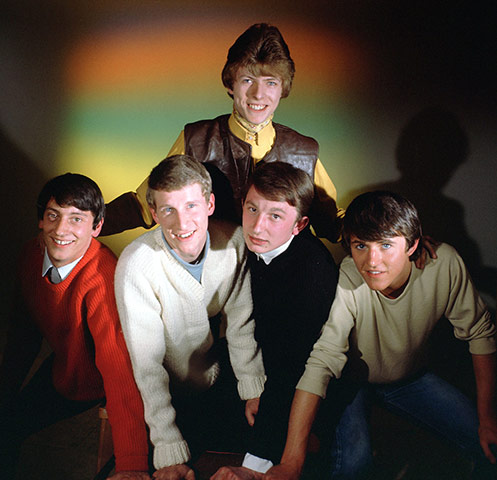
Bowie (then David Jones) with his first professional band, the King Bees. Front row from left: Roger Bluck, Robert Allen, Dave Howard and George Underwood, 1964. Photograph: Dezo Hoffmann/Rex Features

eddie- The Gap Minder
- Posts : 7840
Join date : 2011-04-11
Age : 68
Location : Desert Island
 Re: David Bowie
Re: David Bowie
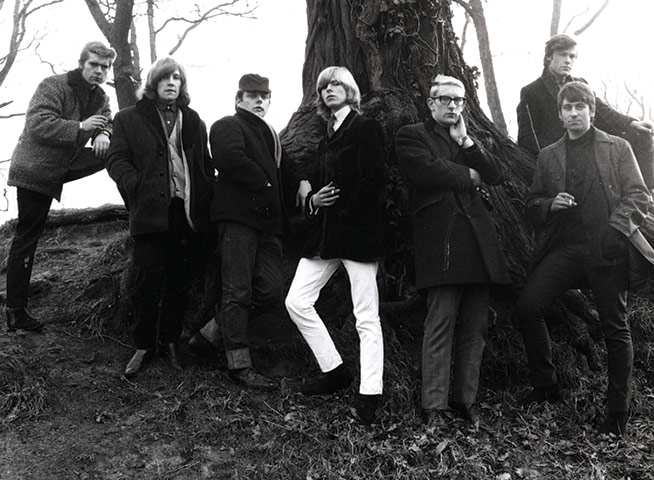
After Bowie split from the King Bees he joined R&B outfit the Manish Boys. Davie Jones and the Manish Boys are pictured here in the band’s hometown of Maidstone, 1965. Photograph: Bob Solly

eddie- The Gap Minder
- Posts : 7840
Join date : 2011-04-11
Age : 68
Location : Desert Island
 Re: David Bowie
Re: David Bowie

Bowie models John Stephen clothes for a Fabulous magazine feature in 1965. He is photographed with model Jan De Souza in Soho’s Kingly Street. Photograph: Fiona Adams/Redferns

eddie- The Gap Minder
- Posts : 7840
Join date : 2011-04-11
Age : 68
Location : Desert Island
 Re: David Bowie
Re: David Bowie
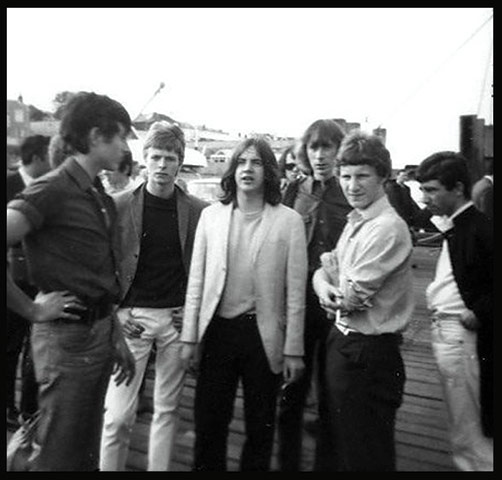
Bowie with the Pretty Things. He is waiting for the ferry to the Isle of Wight, where he supported one of his favourite bands. From left: Graham Rivens (Lower Third bassist), Bowie, Pretty Things' Phil May and Brian Pendleton, unknown and Phil Lancaster (Lower Third drummer), August 1965. Photograph: Denis Taylor

eddie- The Gap Minder
- Posts : 7840
Join date : 2011-04-11
Age : 68
Location : Desert Island
 Re: David Bowie
Re: David Bowie
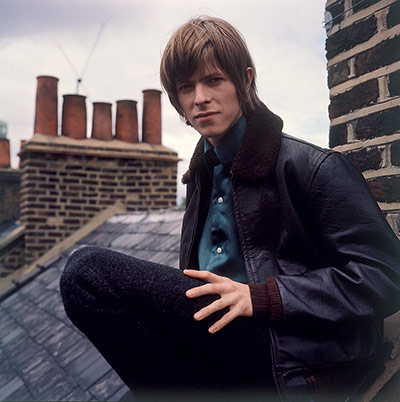
Two months after the release of his first album, Bowie is photographed on the roof of 39 Manchester Street, September 1967. Photograph: Kenneth Pitt

eddie- The Gap Minder
- Posts : 7840
Join date : 2011-04-11
Age : 68
Location : Desert Island
 Re: David Bowie
Re: David Bowie
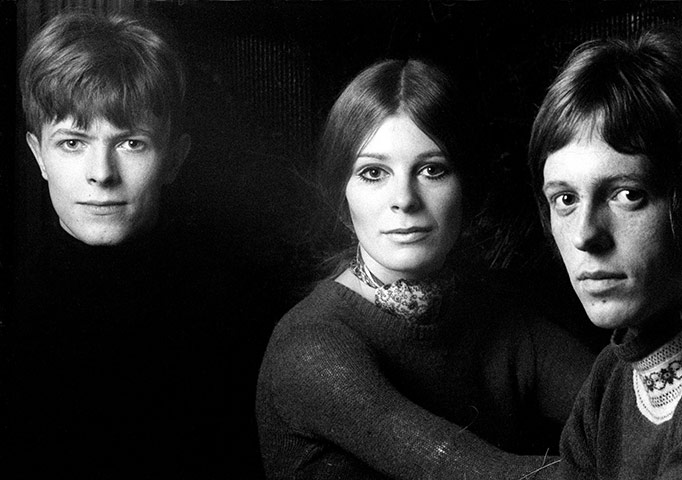
Bowie, then girlfriend Hermione Farthingale and John Hutchinson become mixed-media trio Feathers, November 1968. Photograph: Ray Stevenson/Rex Features

eddie- The Gap Minder
- Posts : 7840
Join date : 2011-04-11
Age : 68
Location : Desert Island
 Re: David Bowie
Re: David Bowie

Bowie in Paddington Street Gardens, Marylebone in 1969. Photograph: Kenneth Pitt

eddie- The Gap Minder
- Posts : 7840
Join date : 2011-04-11
Age : 68
Location : Desert Island
 Re: David Bowie
Re: David Bowie

Bowie at Foxgrove Road, the morning after the moon landing, July 1969. Photograph: Ray Stevenson/Rex Features

eddie- The Gap Minder
- Posts : 7840
Join date : 2011-04-11
Age : 68
Location : Desert Island
 Re: David Bowie
Re: David Bowie
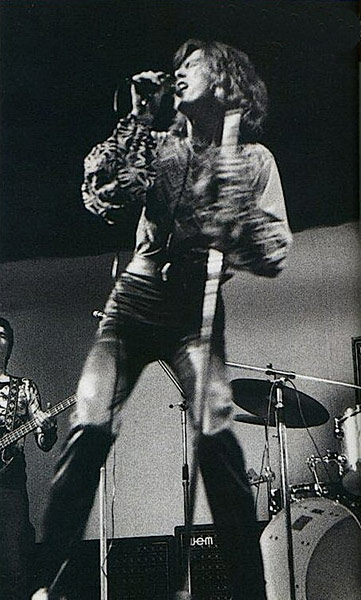
The last performance by David Bowie and Hype. The Roundhouse, July 1970. Photograph: Any Day Now

eddie- The Gap Minder
- Posts : 7840
Join date : 2011-04-11
Age : 68
Location : Desert Island
 Re: David Bowie
Re: David Bowie

Bowie performing at a party in Los Angeles in 1971. Photograph: Michael Ochs Archives/Getty

eddie- The Gap Minder
- Posts : 7840
Join date : 2011-04-11
Age : 68
Location : Desert Island
 Re: David Bowie
Re: David Bowie

Bowie and Mick Ronson at the former's RCA signing in New York, September 1971. During the same trip, Bowie met Andy Warhol for the first time. Photograph: Any Day Now

eddie- The Gap Minder
- Posts : 7840
Join date : 2011-04-11
Age : 68
Location : Desert Island
 Re: David Bowie
Re: David Bowie

'The idea of fame was an obsession – until it happened.' Ziggy’s first photocall, January 1972. Photograph: Brian Ward/David Bowie

eddie- The Gap Minder
- Posts : 7840
Join date : 2011-04-11
Age : 68
Location : Desert Island
 Re: David Bowie
Re: David Bowie

Bowie preparing for a show. Ziggy mania had just started to sweep the UK in 1972. Photograph: Byron Newman

eddie- The Gap Minder
- Posts : 7840
Join date : 2011-04-11
Age : 68
Location : Desert Island
 Re: David Bowie
Re: David Bowie

Prior to his famous Starman appearance on Top of the Pops, Bowie and the Spiders performed the song for children’s TV show Lift Off With Ayshea, June 1972. Photograph: ITV/Rex Features

eddie- The Gap Minder
- Posts : 7840
Join date : 2011-04-11
Age : 68
Location : Desert Island
 Re: David Bowie
Re: David Bowie
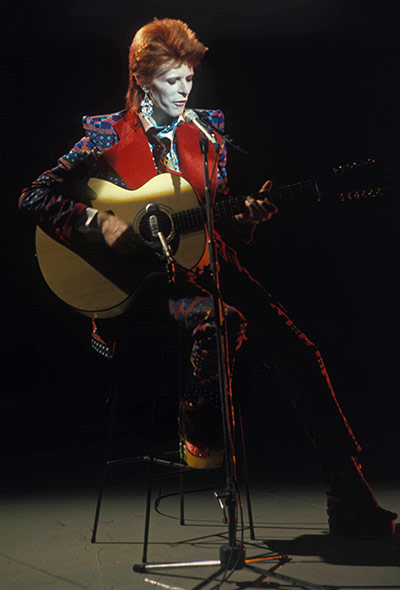
Performing My Death on Russell Harty Plays Pop, January 1973. Photograph: ITV/Rex Features

eddie- The Gap Minder
- Posts : 7840
Join date : 2011-04-11
Age : 68
Location : Desert Island
 Re: David Bowie
Re: David Bowie
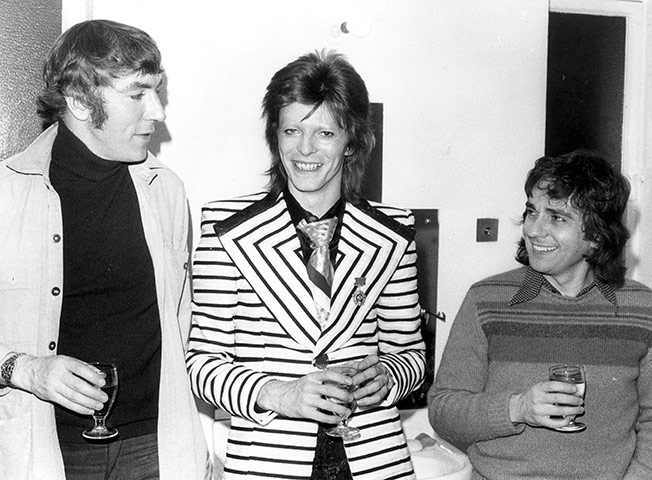
Pictured with Peter Cooke and Dudley Moore after the duo's Behind the Fridge show at London’s Cambridge Theatre in May 1973. In 1971 David had asked Moore if he would play piano on a Hunky Dory track, though there is no record of a response. Photograph: Keystone/Getty Images

eddie- The Gap Minder
- Posts : 7840
Join date : 2011-04-11
Age : 68
Location : Desert Island
 Re: David Bowie
Re: David Bowie

In 1974, Bowie asked Belgium artist Guy Peellaert to create a half-man/half-dog Dr Moreau type album cover image. Peellaert’s work generally involved heavily airbrushed, manipulated images. Photograph: Terry O'Neill/Getty Images

eddie- The Gap Minder
- Posts : 7840
Join date : 2011-04-11
Age : 68
Location : Desert Island
Page 1 of 2 • 1, 2 
Page 1 of 2
Permissions in this forum:
You cannot reply to topics in this forum

